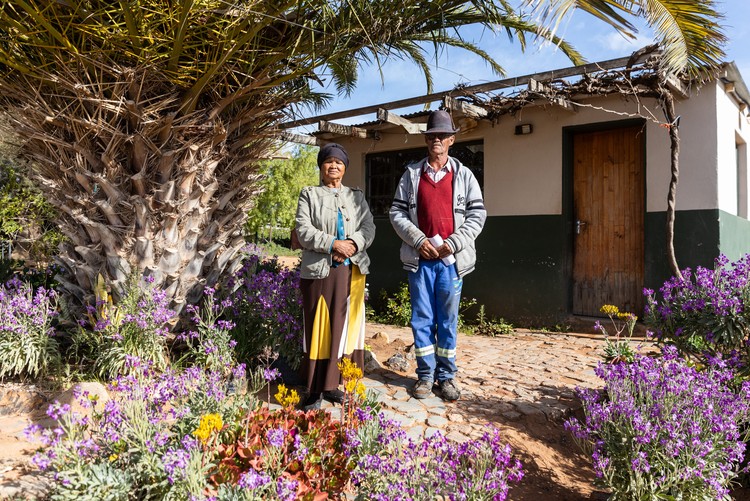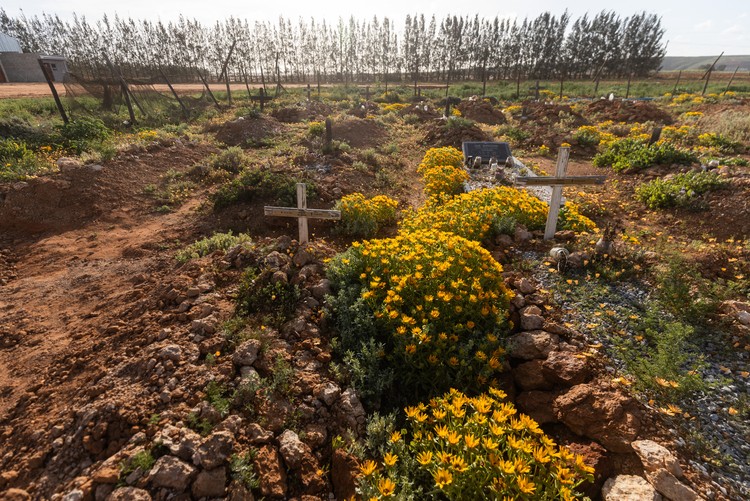“I want to take my last breath in this house” says Cape farm dweller facing eviction
The families are refusing the leave, saying life on the farm is all they’ve ever known
Anna and Dawid Saal stand outside their home on Welverdiend farm in Vredendal, Western Cape. Anna, who has lived there since birth, is among several families who have been informed that they need to vacate their homes by the farm’s current owner. Photos: Ashraf Hendricks
- Families living on a farm in Vredendal on the West Coast are being evicted from the homes they have lived in for most of their lives.
- The current farm owner purchased the property in 2015 for commercial agriculture.
- He wants the tenants to leave the houses so that his current employees can move in. None of the people living on the farm are currently employed by the farmer.
- In an attempt to secure the families’ tenure, the Department of Agriculture, Land Reform and Rural Development had offered to buy the portion of the farm where they live. However, this offer was not accepted by the current owner.
- The matter is expected to be heard in the Land Claims court.
Two families on a farm in Vredendal on the West Coast are being evicted from the homes they have occupied for several generations.
Several other tenants also living on Welverdiend Farm have been told to relocate to RDP houses in Vredendal North.
The residents, most of whom have lived on the farm all their life, do not want to move to a township which they say is dangerous and has frequent incidents of crime. They also don’t want to leave the farm because the graves of their parents, siblings, children and other relatives are on the property.
These are some of the farm dweller houses on Welverdiend farm.
The current owner, Truter Lutz, purchased the farm for commercial agriculture in 2015. He wants the tenants to leave the houses so that his current employees can move in as the farm is about ten kilometres from the nearest urban area. None of the people currently living on the farm are employed by Lutz.
Welverdiend mostly farms fruit, vegetables and nuts for both the local and international market.
In an attempt to secure the families’ tenure, the Department of Agriculture, Land Reform and Rural Development had offered to buy the portion of the farm where they live. However, this offer was not accepted by the new owner. The matter is expected to be heard in the Land Claims court. No court date has been set yet.
According to court papers dated 30 May 2023, seen by GroundUp, the land was “free of any encumberments or land claims of any kind” at the time of purchase.
Meanwhile, Andreas Finana whose family has lived on the farm for many generations says he remembers life there while he was growing up. Finana, now 50, points to a tree nearby where he had carved out his name as a young child.
According to Lutz’s affidavit, Finana was employed at Welverdiend from August 2020 until January 2022, when he was dismissed.
Andreas Finana says his family has lived on this farm in Vredendal for many generations and many of his relatives’ graves are still on the property.
Finana lives with his sister and one of his children. “This farm has passed through three hands since my birth,” he says. “I want to take my last breath in this house and be buried up here.”
Finana says they are worried what life would be like if they have to leave the peace that comes with living on a farm. “Here I can leave all my doors and windows open. I can leave my laundry outside. I can walk over to that house anytime of the day or night … I feel safe here.”
Elderly couple Anna and Dawid Saal were among the several tenants who received a letter that they needed to relocate to an RDP house. All four of their children were born on the farm. Anna was born on the farm in 1953 and her parents had worked on the farm. Dawid moved to the farm when they got married in the 1970s. Their son was also buried near their home.
Dawid says they struggled to understand what the “big words” in the letter actually meant. Dawid said their son was buried in the graveyard on the farm and he also wants to be buried there.
Thys Beukes and his elderly mother, Christina, outside their home on the farm. They are among the families who have been allocated RDP houses in Vredendal North.
Thys Beukes, who was a seasonal worker for one of previous farm owners, says he worries about his elderly mother’s health and quality of life should they be successfully evicted. “She is too old to move to the place they want us to relocate to. There are murders, rapes, and thievery,” he says.
Coleen Arnolds, development facilitator at the Surplus People Project — a local organisation helping the farm dwellers — told GroundUp that there was “lots of violence” in Vredendal North and that it would be a major change for this group to be forced to move there.
She said the RDP houses in Vredendal were cramped and didn’t have much space for the farm dwellers’ to sustain themselves by “planting vegetables” like they do on the farm.
We sent several questions to the Department of Agriculture, Land Reform and Rural Development. Officials told GroundUp that they could not comment before the matter is adjudicated in court.
Many of the farm dwellers have relatives buried here. They are worried what will happen to these graves should they be evicted.
When we contacted the farm owner, Mr Lutz, his legal representative, Steph Grobler responded to GroundUp, which we have published below in full:
“Our client does not intend to answer each and every one of your queries and the same should not be construed as an admission or denial of the same. Our client also reserves the right to respond at a later point in time should our client deem the same to be necessary.
Our client is a commercial farmer and the land in question is zoned for agriculture purposes. The farm was purchased free of any land claims and/or other encumberments. Our client confirms that there are two (2) pending Extension of Security of Tenure Act (ESTA) eviction matters. The respondents are represented by Legal Aid South Africa and have this week filed a notice of appearance confirming the intention to oppose the matters. Our client will continue to follow the lawful process and will continue to engage with all the interested parties in an attempt to find an amicable solution.
It is specifically confirmed that there are no aged persons amongst the respondents or occupiers who enjoy protected status under section 8(4) of the Act. There are certain occupiers who enjoy protected status who have received RDP houses in the local housing project. In terms of the applicable municipal legislation and rules pertaining to subsidies, the recipients/beneficiaries are required to accept the allocation and are to reside in the house in question themselves. It is common cause that a real right in property, which so few of our citizens have the privilege to enjoy, is a stronger right than any personal right that is acquired through the operation of the ESTA Act.
Our client is of the view that the aforementioned persons should relocate peacefully to their allocated houses and take occupation thereof. Our client has attempted to meet with the occupiers to determine how they can be of assistance to relocate them peacefully to their RDP houses. These attempts have to date hereof been futile and met with hostility.
In these instances, the state has fulfilled its section 26 duty, and the beneficiary should accept the allocation and take occupation forthwith. To expect a private landowner to continue to house occupiers when they have alternative accommodation available is prejudicial to the landowner and to the commercial viability of the farm. The intention of ESTA, as it is clear from the preamble, is to provide security of tenure to vulnerable farm workers who do not enjoy access to alternative accommodation. It could never have been the intention of the legislature that persons who have received state grants (again a reference to the law in this regard) should be able to remain on the farm and enjoy possession and occupation of both premises. ESTA speaks to the permanence of residence, as does the applicable rules pertaining to individual housing subsidies/RDP houses.
Our client will continue to follow a lawful process in this regard and will engage with the interested parties including the local municipality in an attempt to find an amicable solution. In the event the parties are unable to find an amicable solution, our client will follow the applicable legal process.
You are required to send any intended article or statement to us for approval to ensure that our comment is not published out of context.
Our rights as well as those of our clients remain fully reserved.”
Next: Conflict over land for rail line occupiers
Previous: Hundreds walk to celebrate recovery from addiction
Letters
Dear Editor
Wow! This is so cruel I can't even say anymore. How do you expect people who lived in a place for so long to just up and leave? I bet he won't even give them access to the graveyard should he get his way. What a cruel man! Close your ears to people's cries and one day you will cry and nobody, no one, niemand, will hear you. Profit before humans.
Dear Editor
A typical corporate response to a very human problem! Surely a compromise could be reached. As the occupants have been living there all their lives the new owners should show some empathy. Would it kill them to do this?
Dear Editor
I am very disturbed by Mr Lutz's actions on his planned eviction of these poor souls, especially in this day and age. He clearly has no empathy for these farm dwellers but is only concerned with what he stands to benefit. He might even win the court case going forward because of his financial position but I bet climate change will humble him. He may not see the fruit of all his efforts on this farm.
© 2023 GroundUp. This article is licensed under a Creative Commons Attribution-NoDerivatives 4.0 International License.
You may republish this article, so long as you credit the authors and GroundUp, and do not change the text. Please include a link back to the original article.
We put an invisible pixel in the article so that we can count traffic to republishers. All analytics tools are solely on our servers. We do not give our logs to any third party. Logs are deleted after two weeks. We do not use any IP address identifying information except to count regional traffic. We are solely interested in counting hits, not tracking users. If you republish, please do not delete the invisible pixel.







